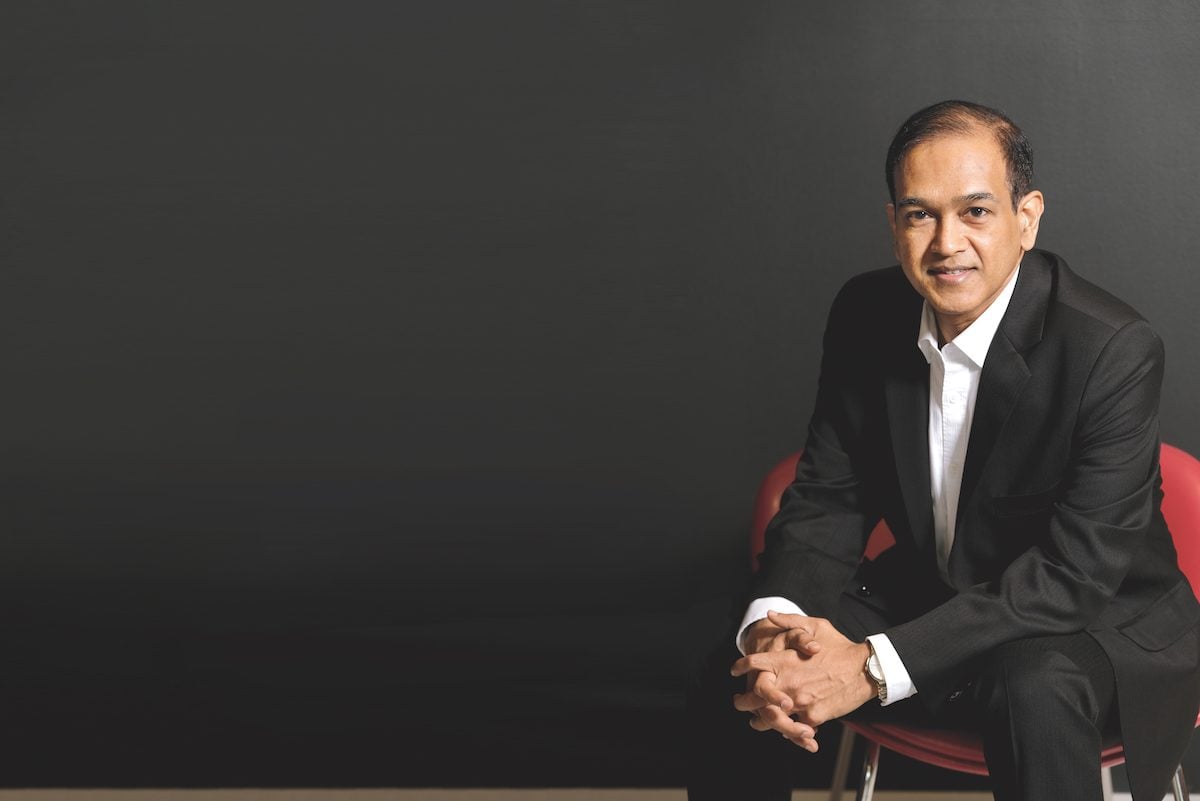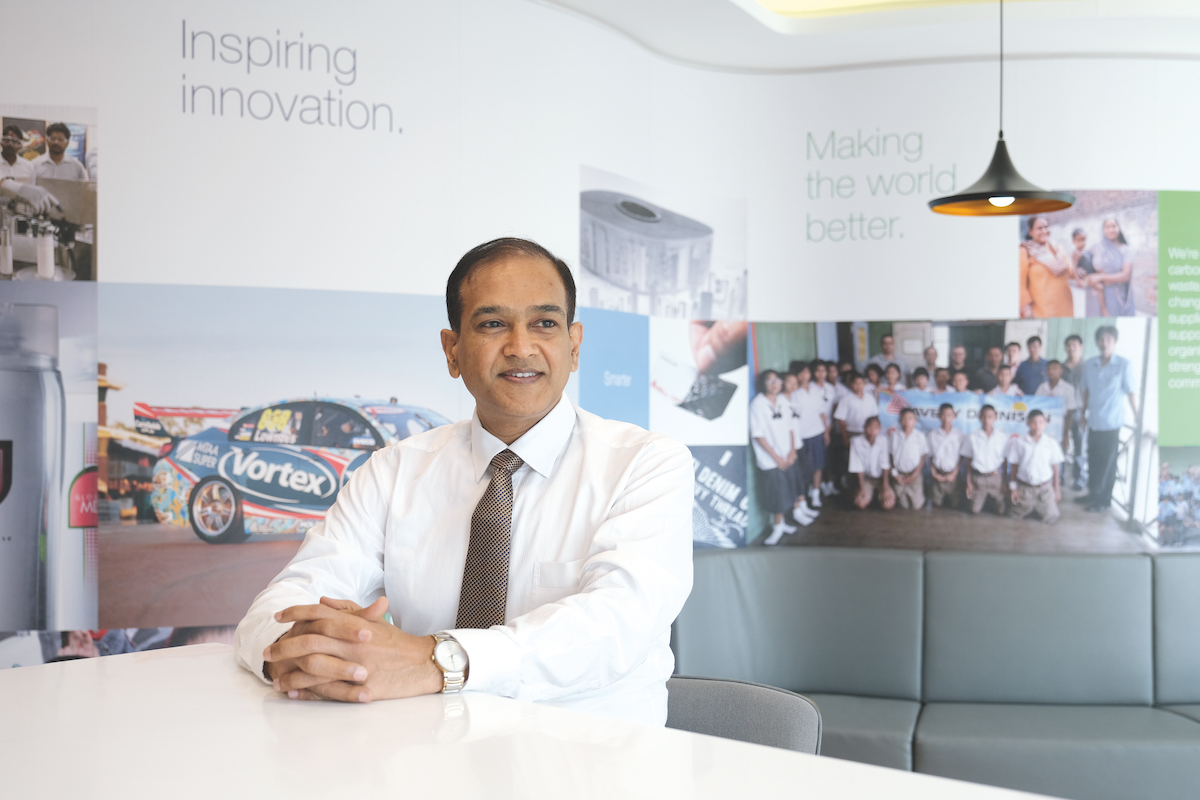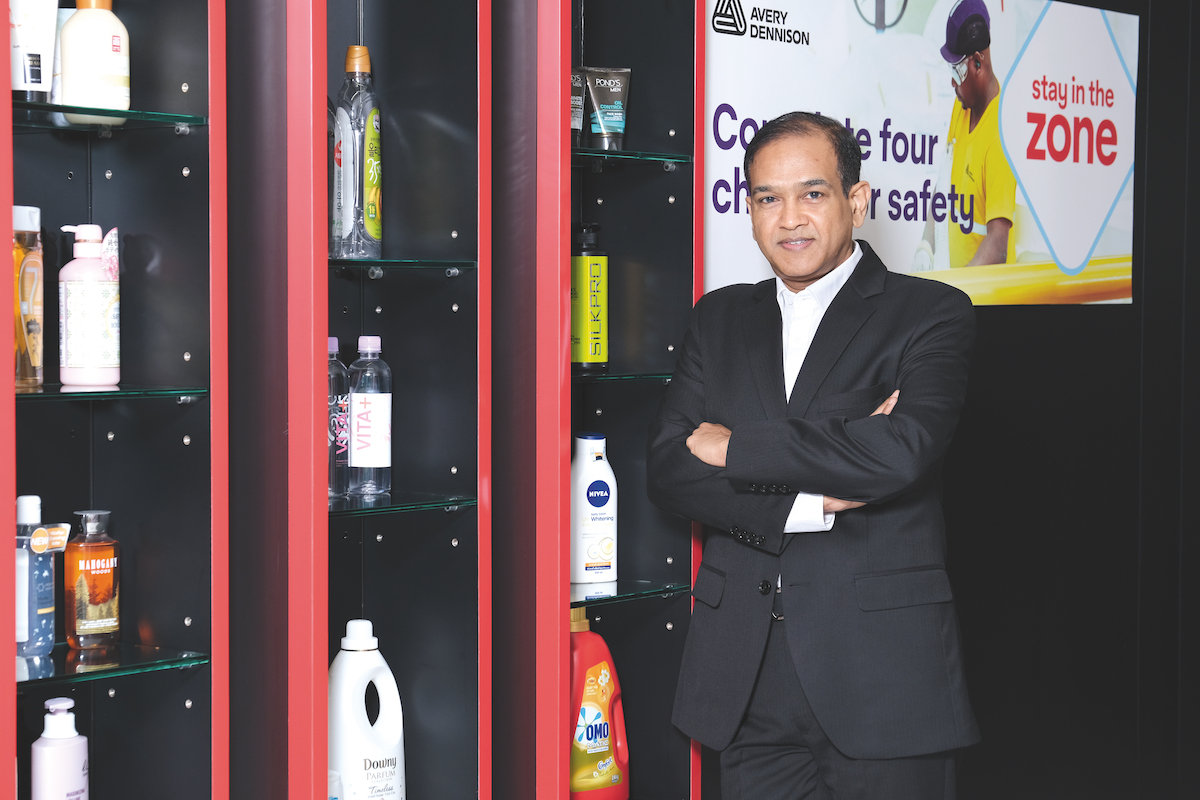Sustainability has rapidly become a central aim for organisations across the world. But for labelling and packaging multinational Avery Dennison, innovation and sustainability have been at the core of its business since day one.

“As a company, we are working out how to stay relevant for the next 80 or 100 years – that’s what drives most of the conversations we’re having about innovation,” explains Anil Sharma, Vice President and General Manager, Label and Graphic Materials, Asia–Pacific at Avery Dennison.
Almost 10 years ago, Avery Dennison made a major commitment to invest in radio frequency identification technology, which is now paying dividends. “We’ve also launched atma.io, which is a data-based platform that allows brand owners and customers to manage analytics for products that are moving in the value chain. This can be used to improve the customer experience too,” he says.
Sustainable Agenda
Sustainability is going to challenge businesses to innovate in ways they may not have considered previously. In order to foster an environment that enables staff to perform at their very best and innovate, Anil believes the right culture needs to be created.
“A mindset of experimentation and getting comfortable with making mistakes so we can learn from them will be a critical part of success,” he predicts. “I have been teaching our teams that it’s OK to fail – failing is part of the process.”
At Avery Dennison, innovation in the future is going to be found at the cross-section of materials technology. With the 2030 Sustainable Development Goals firmly at the front of mind, Anil and his team have targeted three key areas where they believe the most impact can be made in addressing sustainability.
“The three specific domains that we’re looking at are delivering innovations to advance the circular economy, reducing our environmental impact as a business and creating a positive social impact for communities and people,” he explains.

Progress is already being made towards these ambitious targets, especially when it comes to innovation in the circular economy. “To give you an example, the label we make that goes on a product is less than 1% of the item’s entire mass. When the brand owner wants to re-use or recycle 99%-plus of the materials in a circular format, our label is an enabler, not an impediment to that,” Anil points out.
The CleanFlake technology, which makes sure that labels and adhesive separate from polyethylene terephthalate, is a direct result of this drive to become more sustainable. “It’s something we have created as an industry-wide platform that allows for a quick removal of the label in the recycling process,” he says.
Avery Dennison is also working to make sure that the materials the company uses are being sourced from replenishable resources which have a less negative impact on the environment.
Covid Impact
The emergence of COVID-19 took all businesses by surprise. From logistical difficulties to supply chain challenges, adapting to this new normal required strong leadership and a forward-thinking plan. As Avery Dennison has a large footprint in Asia, the first region to feel the impact of the pandemic, the business was able to gain firsthand experience in how to handle the crisis.
“The insights coming from the local operations in China really helped us prepare for COVID and gave us a playbook that we could then deploy in other parts of the country and across the world as the pandemic spread,” Anil says.
Facing intense demand fluctuations as lockdowns came and went meant the company’s just-in-time supply structure had to be optimised, at the same time as ensuring employees were kept safe. “Managing this unique scenario required strong planning and logistics team coordination because supplies are spread across the region,” he shares. “Partnership, transparency and collaboration became all the more important due to COVID-19 because we can’t solve challenges like this on our own.”
Anil attributes Avery Dennison’s resilience during the pandemic to the strength of its relationships to stakeholders. “By helping navigate a difficult situation for our customers and, more importantly, working with our customers’ customers to bring more visibility to the planning process, this allowed us to deal with large parts of the crisis.”
Before COVID-19, the vast majority of the company was structured around going to the office or manufacturing facility and working. But with stay-at-home orders and lockdowns, Anil reveals the business had to quickly adapt and ensure staff could be productive and as effective in the home environment as they were in the office.

“COVID-19 forced many people to work remotely, blurring the line between work life and home life,” he says. “We need to find ways that allow our employees to maintain good quality of life, including a well-balanced approach to working from home – that has become the reality.”
“As a company, we are working out how to stay relevant for the next 80 or 100 years – that’s what drives most of the conversations we’re having about innovation.”
Exciting Future
To build on the success Avery Dennison has already achieved, Anil believes it’s vital to include all its stakeholders in an equitable and inclusive way. “It’s about making sure that as we grow, we are giving serious focus and attention to diversity, inclusion and equity,” he insists. “We’re consciously driving diversity within the organisation so that we resemble the population that we serve in different markets.”
With a goal of operational excellence and experimental innovation, Anil sees diversity, inclusion and equity as the three key enablers for the company to up its game from where it is today. “Gender diversity is an important part of what we want to work on. It’s not just a nice thing to do, but an absolutely critical aspect of a sustainable and successful business,” he stresses.
Long History
With just several spare parts, a US$100 loan and a very bright idea, Avery Dennison was founded by Ray Stanton Avery in 1935. “It created an industry that spawns materials and led to inventing processes that today allow for a multitude of applications and possibilities,” Anil says.
In the 11 years Anil has spent at Avery Dennison, he’s worked across emerging markets and semi-mature markets. Even after a decade, he still finds his role to be extremely rewarding. “I think Asia is always an exciting place to be. Asia–Pacific is definitely going to be the largest economic output producer by the end of 2030; 40–50% of the world’s gross domestic product will come out of this region in real terms and, along with that, the region is the largest manufacturing hub of the world,” he says.
In the past four years, Anil believes Avery Dennison has been able to steadily improve performance and establish a long-term road map for the region. “We felt there was a need to bring North Asia and South Asia under one larger Asia–Pacific region for greater synergies, including leveraging the deeply connected and integrated supply chains and value chains across the two regions,” he tells.
With forecasts showing that the largest middle-class population is going to be based in Asia in the coming years, the company is well-prepared to meet the needs of this burgeoning market. “There’s a lot left to do both in terms of who we are today and who we can become in the future – that’s the exciting part of what we’re working on.”


